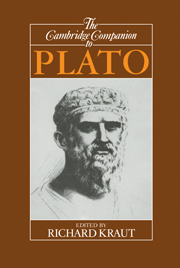Book contents
- Frontmatter
- 1 Introduction to the study of Plato
- 2 Plato
- 3 Stylometry and chronology
- 4 Socrates and the early dialogues
- 5 Mathematical method and philosophical truth
- 6 Inquiry in the Meno
- 7 Plato and Greek religion
- 8 Platonic love
- 9 Plato's metaphysical epistemology
- 10 The defense of justice in Plato's Republic
- 11 Plato on poetic creativity
- 12 Good-bye to the Third Man
- 13 Plato's Sophist on false statements
- 14 Disintegration and restoration
- 15 Plato's later political thought
- Bibliography
- Index
4 - Socrates and the early dialogues
Published online by Cambridge University Press: 28 May 2006
- Frontmatter
- 1 Introduction to the study of Plato
- 2 Plato
- 3 Stylometry and chronology
- 4 Socrates and the early dialogues
- 5 Mathematical method and philosophical truth
- 6 Inquiry in the Meno
- 7 Plato and Greek religion
- 8 Platonic love
- 9 Plato's metaphysical epistemology
- 10 The defense of justice in Plato's Republic
- 11 Plato on poetic creativity
- 12 Good-bye to the Third Man
- 13 Plato's Sophist on false statements
- 14 Disintegration and restoration
- 15 Plato's later political thought
- Bibliography
- Index
Summary
Can the philosophical views of the historical Socrates be distinguished from those of his pupil Plato? And if so, how do the master's views differ from the pupil's? And do these Socratic views add up to a coherent philosophical position?
In Section I of this chapter, I explain the basis on which, following most modern interpreters, I feel able to divide Plato's dialogues into a group of (earlier) “Socratic” dialogues, where the character Socrates speaks more or less for the historical Socrates; and a group of (middle and later) dialogues in which the main character (now not always Socrates) speaks rather for Plato. I argue that the Plato of the middle and later dialogues, though some of his views remain the same, and though he attacks some of the same enemies and for some of the same reasons, has nevertheless in some ways gone well beyond the master. On some points, I suggest, he even contradicts him. In Section II, I contrast these Socratic dialogues with the other dialogues - first, in their form, method, tone, and subject matter; second, in their attitude to the sciences (arts, crafts, expertises), education, rhetoric, and mathematics; and third, in their theories of virtue, desire, and “weakness of will.” In Section III, I address myself to the question with what right I attribute any views at all to a philosopher who claimed that he knew only that he knew nothing - especially when the Socratic dialogues virtually all end negatively.
- Type
- Chapter
- Information
- The Cambridge Companion to Plato , pp. 121 - 169Publisher: Cambridge University PressPrint publication year: 1992
- 45
- Cited by

